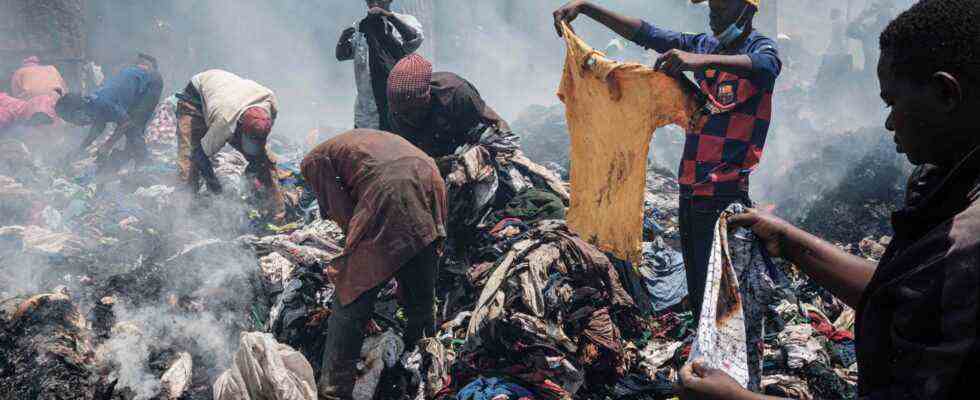Status: 01/22/2022 09:21 a.m
Hundreds of tons of second-hand clothing end up in Ghana alone every day. But a lot of it ends up in the trash. The cheap goods have long since become a danger to nature and people.
On the beach, on the street corners, on the outskirts: mounds of clothes piled high. Smoke often rises, the old clothes burn – there are desperate attempts to get rid of the tons of old textiles. Local residents complain about the stench, headaches and other ailments. Not everyone in Ghana is happy about second-hand clothing anymore.
“I have to watch my finances”
The problem arises, for example, at the Kantamanto market in Ghana’s capital, Accra, a major hub for goods from the West. This is where locals try to snag bargains. Fast fashion comes from Europe, Asia or North America. A shirt, a blouse or pants for about two euros each: That’s what 24-year-old Mary Addae came onto the market for.
It’s much more affordable here than in the shops, says the young woman – and not just for her: “Many shop owners who sell clothes come here to buy the selection for their shops.” That’s why she prefers to come here early in the morning rather than go to the shops. “I have to watch my finances and what I can afford.”
Finding good stuff is a matter of luck
Tons of clothes arrive at Accra’s Kantamanto market every day. Dealers quickly cut open the huge, tied packages and sorted the piles of clothing according to quality. Just like Abraham Bonsu. He buys his goods by the kilo and in tightly packed plastic bales weighing up to 100 kg, says the dealer.
He’s not always lucky. “The heap that we unpacked here – it’s all rubbish,” explains Bonsu. “We throw it away, or we put it aside and someone picks it up for free, or we sell it to someone who sells it far away. But if you lose your money like that, you don’t get it back.”
Fast fashion pollutes the environment
Many retailers like Bonsu complain that almost half of the clothes are unusable for resale and end up directly in the garbage. Justice Lee Adoboe says this has become a major environmental problem in Ghana. He is a member of the Ghana Water and Sanitation Journalists Network (GWJN). The non-governmental organization is trying to draw attention to the problem. Adoboe says the cheap second-hand industry isn’t just destroying the domestic textile industry.
The consequences for nature and humans are catastrophic. “Some of the clothes are just dumped in rivers – and that’s where the danger lies,” says Adoboe. “Because some of the materials have dyes in them and stuff like that. The chemicals get into our waterways and people then drink them as supposedly safe water.” Elsewhere, the tons of clothes clogged waterways and even caused flooding.
Too much dependence on textile imports
Ghana is not an isolated case – other African countries also have similar problems. Some, like Rwanda in East Africa, imposed an import ban on second-hand goods years ago. This is also conceivable for Ghana, says Justice Lee GWJN activist Adoboe. However, there is currently a lack of political will to do so. Also because before there is a ban on second-hand clothing, alternatives would first have to be created – for thousands of families who make a living from buying and selling old clothes from abroad.
Ghana’s Garbage Garbage Mountains: Europe’s Second-Hand Nightmare
Dunja Sadaqi, ARD Rabat, 17.1.2022 2:43 p.m

